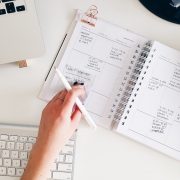
Attention-deficit/hyperactivity disorder (ADHD) is a complex condition that affects individuals in various ways, often impacting their ability to maintain organization and focus.
Here are additional strategies and resources to help manage ADHD symptoms and improve organization skills:
Mindfulness and Meditation: Practice mindfulness techniques and meditation to enhance focus and reduce impulsivity. Apps like Headspace or Calm can be helpful for guided meditation sessions.
Break Tasks into Smaller Steps: Break down larger tasks into smaller, more manageable steps to prevent feeling overwhelmed. Setting achievable goals can boost motivation and productivity.
Utilize Reminder Apps: Incorporate reminder apps or alarms on your phone to prompt you for tasks, appointments, or deadlines. These tools can help you stay on track and remember important events.
Establish Routines: Establishing consistent routines can provide structure and stability. Designate specific times for activities such as waking up, meals, work/study sessions, and relaxation.
Seek Professional Support: Consider seeking guidance from therapists or ADHD coaches who specialize in cognitive-behavioral therapy (CBT) or ADHD management techniques. They can offer personalized strategies tailored to your needs.
Exercise Regularly: Engage in regular physical activity, as exercise has been shown to improve focus, attention, and mood in individuals with ADHD. Find activities you enjoy, whether it’s walking, biking, yoga, or team sports.
Limit Distractions: Minimize environmental distractions by organizing your workspace, using noise-canceling headphones, or implementing website blockers to limit internet distractions while working or studying.
Practice Self-Compassion: Be patient and kind to yourself throughout the process of managing ADHD symptoms. Acknowledge your efforts and progress, even if they’re small steps forward.
Join Support Groups: Connect with others who have ADHD through support groups or online communities. Sharing experiences, tips, and encouragement can provide valuable insights and emotional support.
Research Neurofeedback clinics: Neurofeedback, a form of biofeedback that focuses on monitoring brainwave activity, has shown promise in helping individuals with ADHD improve their symptoms. By providing real-time feedback about brainwave patterns, neurofeedback helps individuals learn to regulate their brain activity, enhancing focus, attention, and impulse control. Through targeted neurofeedback training sessions, individuals with ADHD can strengthen specific brain regions associated with executive functions, ultimately leading to better self-regulation and improved organization skills. Neurofeedback offers a non-invasive and potentially beneficial approach to managing ADHD symptoms and enhancing overall well-being.
Explore Medication Options: Discuss medication options with a healthcare professional if appropriate. Medications such as stimulants or non-stimulants may help alleviate ADHD symptoms when combined with behavioral interventions.
Remember that managing ADHD and improving organization skills is a journey that requires ongoing effort and experimentation. By implementing these strategies and seeking support when needed, individuals with ADHD can enhance their ability to stay organized and navigate daily challenges more effectively.
